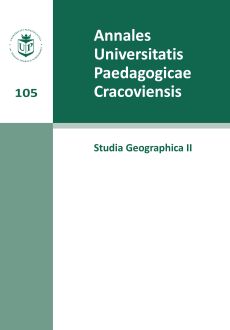Współczesne cele i metody kształcenia w świetle koncepcji Wacława Nałkowskiego
Słowa kluczowe:
Wacław Nałkowski, cele nauczania, metody nauczania, pomoce dydaktyczne, błędy w nauczaniuAbstrakt
An important task of geographical education is thought to be the formulation of teaching objectives, the selection of contents and development of teaching methods. The primary task is then to define teaching objectives since the formulation of objectives is thought to be a decisive factor in the selection of contents and methods. All these topics constitute the subject matter of the special branch of geography distinguished by Nałkowski, namely the „school geography”, which was seen as extremely important. The article contains a comparison of contemporary geography teaching purposes according to Stanisław Zając, and those promoted by Wacław Nałkowski. The author concludes that although the modern geographical education goals are not significantly different from those formulated by Nałkowski, school reality increasingly deviates from the standards fixed by him more than a century ago. Therefore, Nałkowski is a scholar whose views are respected only officially and occasionally, especially at theoretical level. In school practice, however, there are promoted methods and manuals, which serve mainly to fill-in students’ brain with theory, and to break their natural, instinctive resistance.
Bibliografia
Angiel J., 2010, Eseje geograficzne – wykorzystanie w edukacji regionalnej, „Geografia w Szkole”, nr 5, s. 12–14.
Mularczyk M., Kowalska A., 2003, Postawy gimnazjalistów wobec geografii szkolnej, „Geografia w Szkole”, nr 5, s. 16–20.
Nałkowski W., 1920, Zarys metodyki geografii, wyd. II, Wydawnictwo M. Arcta w Warszawie, Poznań–Łódź–Lublin–Wilno.
Nałkowski W., 1968, Dydaktyka geografii, oprac. G. Wuttke, PZWS, Warszawa.
Piskorz S. (red.), 1997, Zarys dydaktyki geografii, WN PWN, Warszawa.
Piskorz S., Wężowicz-Bochenek B., 2010, Trudności w pracy geografii i ich przezwyciężenie, „Geografia w Szkole”, nr 5, s. 5–11.
Rodzoś J., Szczęsna J., Wojtanowicz P., 2008, Transformacje geografii szkolnej, [w:] A. Hibszer (red.), Polska dydaktyka geografii. Idee – tradycje – wyzwania, Wydział Nauk o Ziemii Uniwersytetu Śląskiego, Sosnowiec, s. 99–110.
Stankiewicz M., 2000, Znaczenie map topograficznych w nauczaniu geografii oraz kształtowaniu wiedzy o swoim regionie, „Geografia w Szkole”, nr 2/3, s. 74–80.
Zając S., 1997, Cele nauczania geografii, [w:] Piskorz S. (red.), Zarys dydaktyki geografii, WN PWN, Warszawa, str. 29–42
Pobrania
Opublikowane
Numer
Dział
Licencja
Złożenie artykułu do druku oznacza wyrażenie zgody na bezpłatne (tj. bez honorariów autorskich) przeniesienie autorskich praw majątkowych na Wydawcę i zezwolenie na wydanie pracy w postaci drukowanej w dowolnej liczbie egzemplarzy oraz zamieszczenie jej w postaci otwartego dostępu na stronie internetowej czasopisma, w bibliotekach cyfrowych oraz innych cyfrowych platformach wydawniczych, z którymi Wydawca zawarł lub zawrze stosowne porozumienie o udostępnianiu. W przypadku artykułów wieloautorskich przyjmuje się, że autor zgłaszający pracę („correspondingauthor”) ma pełnomocnictwo do reprezentowania pozostałych współautorów w tym zakresie. Autorzy są proszeni o podpisanie stosownego oświadczenia w tej sprawie.

